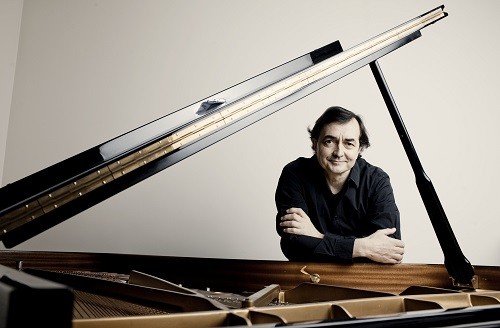
 United Kingdom Edinburgh International Festival 2024 [12]: Kleio Quartet (20.8), Pierre-Laurent Aimard (piano, 21.8). Queen’s Hall, Edinburgh, 20 & 21.8.2024. (SRT)
United Kingdom Edinburgh International Festival 2024 [12]: Kleio Quartet (20.8), Pierre-Laurent Aimard (piano, 21.8). Queen’s Hall, Edinburgh, 20 & 21.8.2024. (SRT)

Both these concerts placed old and new alongside one another, but in different ways and with different results.
The Kleio Quartet’s programme stretched from Haydn right up to the present day, their Haydn maintaining classical poise with full-bodied melodic elegance. There was an earnest sense of busyness in the first movement’s development, but with a lovely feeling of balance that held up through the gypsy-inspired Menuet and the twinkling cat and mouse finale. They also managed to make something unusually searching out of the simply minor key theme that served as the basis for the slow movement.
Britten’s youthful Divertimenti made a shrewd choice as a concert opener, and the quartet hurled themselves into the opening march and the final Burlesque, making these pieces sound really substantial. In fact, Britten’s music played to their strengths because, throughout this concert, the Kleios Yume Fujise, Katherine Yoon [violins], Jenny Lewisohn [viola] and Eliza Millett [cello]) played with a beautifully clear sound, every line evenly audible, with four equal partners balancing one another beautifully.
By far the most substantial work, however, was Wynton Marsalis’s first (and, to date, only) string quartet. The title betrays its inspiration. Marsalis wrote the piece thinking about his youth in New Orleans where, it is said, the Octoroon Balls acted as social occasions for all sections of society to gather and have fun. Consequently, Marsalis’s music is influenced by the musical melting pot of New Orleans, containing traces of all sorts things from Dixieland to Rag and much in between.
That puts it pretty far beyond the purview of most classical string quartets, and the Kleio players deserve a tip of the hat for taking it in their stride with such confidence. The first movement, a solo for the first violin, was like a leader calling time in a barn dance, and countless other touches were deeply evocative of the deep south, with woozy swings and slushy harmonies, and a Creole contredanse that sounded cool enough to come from uptown Manhattan.

If there is a criticism then it is that a lot of Marsalis’s material feels overworked and spun out. As I thought when I heard his Violin Concerto, a lot of the music ideas feel extended beyond their natural span, spinning notes prolonged to when they had lost their most powerful flavour. Maybe that a jazz musician’s vice of not quite knowing when to stop. Still, it was interesting to hear, and the Kleio Quartet played it very well.
The other set of juxtapositions came from pianist Pierre-Laurent Aimard, and if the time span involved was less extreme then it was perhaps even more aurally striking. At the centre of his Wednesday morning programme sat the piano music of Schoenberg, interspersed among pieces by Schoenberg’s contemporaries (Webern) and predecessors (Schumann and Brahms).
It is a typically erudite piece of programming, put together by someone who can be relied on to think deeply, and lots of it worked very well. He argued a powerful case that the emotionally charged harmonies of late Brahms and Schumann are the soil in which Schoenberg’s innovations grew. Schoenberg’s Op.33 piano pieces seemed to have richer harmonies and even cleaner melodies when heard after Brahms’s Op.118 intermezzi, and the dark harmonic experiments of Robert Schumann’s Gesänge der Frühe seemed to suggest that Schoenberg’s Op.23 wasn’t quite so big a leap. There was always a bit of an aural lurch in going from these Romantic masters to Schoenberg’s pinprick precision. The juxtaposition was less striking but perhaps more pertinent when hearing the pointillist textures of Schoenberg’s Op.19 next to Webern’s Op.27 variations, whose raw spareness felt like dental floss for the ears.
It was telling that the smallest leap seemed to be from Scriabin to Schoenberg. Scriabin’s Black Mass Sonata, with its dangerous clouds of harmonies and its dark tempest of suggestion, seemed not at all dissimilar in texture to Schoenberg’s three Op.11 pieces. But regardless of whether or not you bought Aimard’s overall argument, there was no disputing that he played each composer’s work with equal energy, equal precision and equal passion. Interesting programmes like this are exactly what the Edinburgh International Festival is here to bring.
Simon Thompson
The Edinburgh International Festival runs at venues across the city until Sunday 25th August. Click here for further details.
20.8.2024 – Kleio Quartet, Queen’s Hall.
Britten – Three Divertimenti
Haydn – String Quartet in D, Op.20 No.4
Wynton Marsalis – At the Octoroon Balls (String Quartet No.1)
21.08.2024 – Pierre-Laurent Aimard (piano), Queen’s Hall.
Brahms – Intermezzi, Op.118 Nos. 1, 2 & 4
Schoenberg – Piano Pieces, Op. 33a & 33b; 5 Piano Pieces, Op.23; 6 Little Piano Pieces, Op.19; 3 Piano Pieces, Op.11
R. Schumann – Gesänge der Frühe
Webern – Variations, Op.27
Scriabin – Sonata No.9
